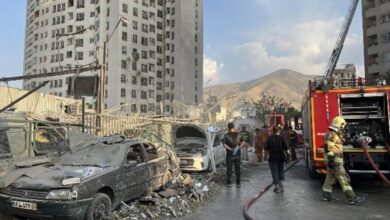The U.S. threatens to reimpose sanctions on Venezuela if President Maduro fails to meet critical democratic reforms, marking a pivotal moment in U.S.-Venezuela relations.

11/30/2023.- National Security Council Strategic Communications Coordinator John Kirby speaks during a press briefing at the White House in Washington, DC, USA, 30 November 2023. EFE/EPA/YURI GRIPAS / POOL
The Latin American Post Staff
Escucha este artículo
Leer en español: Estados Unidos presiona a Venezuela para que cumpla con reformas democráticas
Diplomatic Crossroads: U.S. Stance on Venezuela's Sanctions
In a high-stakes diplomatic chess game, the United States is poised at a critical juncture, ready to "reconsider" its recent easing of sanctions on Venezuela if President Nicolas Maduro does not honor specific commitments by this Thursday. This development signals a potential reversal of the Biden administration's softer approach towards the OPEC member nation, a shift initiated in response to agreements for a 2024 election between Maduro's government and the Venezuelan opposition.
The U.S. State Department, maintaining a firm stance, has outlined clear expectations for the Venezuelan government. By the end of November, Caracas must detail steps towards lifting bans on opposition candidates and initiate the release of both Venezuelan political prisoners and "wrongfully detained" Americans. This ultimatum is part of a broader U.S. strategy to bolster democracy and human rights in Venezuela.
Uncertainties Loom: Questions Surrounding U.S. Actions
However, the speed and extent of potential U.S. actions to withdraw sanctions relief still need to be clarified, as does the minimum threshold Maduro must meet to prevent a forceful American response. This uncertainty adds a layer of complexity to the already tense U.S.-Venezuela relations.
In a significant softening of the stringent sanctions imposed during the Trump era, the U.S. granted a six-month general license for transactions with Venezuela's crucial oil and gas sector and authorized operations of the state gold mining company, Minerven. Additionally, the U.S. lifted a prohibition on secondary-market trading of Venezuelan sovereign bonds.
U.S. Secretary of State Antony Blinken has been evident in his stance: the U.S. will "reverse" these leniencies if Maduro does not demonstrate tangible progress in reinstating all banned candidates and releasing detained U.S. nationals and Venezuelan political prisoners by November's end.
The White House's national security spokesperson, John Kirby, expressed concerns about the lack of progress thus far. "We haven't seen any progress yet," he said, leaving the door open for U.S. actions based on Venezuela's decisions in the coming days.
The State Department spokesperson echoed Blinken's warning, emphasizing the contingent nature of the sanctions relief on Maduro's compliance. However, no specific details were provided about the potential U.S. response.
In contrast, the Venezuelan government has not responded to these developments directly. Jorge Rodriguez, leading Maduro's dialogue with the opposition, asserted in mid-November that the government "does not accept ultimatums."
Critical Decision: U.S. Dilemma Amidst Global Issues
The U.S. now faces a crucial decision: to reignite tensions with Venezuela amidst other pressing global issues like the Israel-Hamas conflict and Russia's involvement in Ukraine. This decision is complicated by uncertainties and skepticism regarding the extent of U.S. actions. Some sources in Washington speculate that initial responses might include reinstating sanctions on Minerven.
Venezuelan courts may progress appeals from banned politicians, as per sources familiar with the matter, in what could be seen as a partial compliance effort. Notably, Maria Corina Machado, the opposition's presidential primary winner, remains barred from office.
Though the Venezuelan government released five political prisoners in October, no further releases have been reported, adding to the tension and uncertainty surrounding the U.S.'s next move.
Also read: Venezuela Commemorates Bicentenary of Monroe Doctrine with a Voice of Resistance
This situation encapsulates the challenges of diplomatic negotiations in an era of complex international relations. As the deadline approaches, the world watches closely, understanding that the decisions made in these crucial days will not only shape the future of Venezuela but also signal the Biden administration's approach to international diplomacy and its commitment to democratic values and human rights globally.




